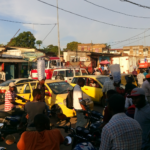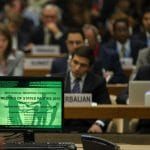Reality check: No time to waste before the 2011 BWC Review Conference
By Malcolm Dando | June 15, 2010
With the end of the academic year approaching and the 2010 Nuclear Non-Proliferation Treaty Review Conference already over, I had been looking forward to a little relaxation: After tidying my office, I planned to sit back and watch England win the World Cup in South Africa. Unfortunately for me, my summer plans were dashed when I realized that my office begged for much more than mere tidying. I was quickly brought back to reality–and that return to reality was not connected to England’s chances of winning the World Cup.
For safety reasons (and because accident incident paperwork can be such a nuisance), my end-of-year cleanup ritual begins with clearing out the piles on my office floor. The first two stacks–towers of articles and other material on bioethics and international law–I quickly refilled or discarded. But in the middle of the third pile–articles on WMD proliferation regimes–I encountered an article that I had once marked up with great care.
The article was written in 2005 by John Freeman (at the time, he was the permanent representative of the United Kingdom to the Conference on Disarmament in Geneva and the UK’s ambassador for multilateral arms control and disarmament) in the run-up to the 2006 Sixth Review Conference of the Biological and Toxin Weapons Convention (BWC). As chair of the BWC Meetings of Experts, Ambassador Freeman had successfully brought many new “stakeholders”–particularly scientists and scientific organizations–into the discussions on codes of conduct. Five years ago, he asked a basic question: What more could the BWC review process contribute? With the Seventh BWC Review Conference scheduled for next year, that question is timely once again.
The BWC Review Conference is an irreplaceable tool in efforts to prevent the possible use of biological weapons. The convention sets the international community’s normative standard on biological weapons control: The life sciences can only be used for peaceful purposes. As Freeman argued, the problem in the early years of the twenty-first century is how to sustain that norm. There are two dimensions to the challenge, according to Freeman: “First, together and individually, we need to act in ways conducive to the [BWC] retaining its normative authority”; and secondly, we must “ensure that the instrument continues to be able to respond to the evolving character of the biological threat.”
The function of the Review Conference is to ensure achievement of the second objective and thereby help to secure the first. Yet as Freeman noted, although “there are limited numbers of ways to make a nuclear weapon, regrettably there are all too many and all too changing ways of posing biological threats.” He addressed in his article three issues within that context: what the BWC review process has achieved; what it can and should do; and what it should do in 2006 and beyond.
Regarding achievements, Freeman stated correctly that different points of view are possible. For example, the norm has been strengthened by the increasing number of states that are party to the BWC, but also weakened by the illegal state-level offensive biological weapons programs, e.g. in the former Soviet Union and Iraq, that took place during and after the Cold War. In terms of what the Review Conference might do, Freeman cited many areas that need work, including the fact that some states were not just outside the convention but also in key areas of conflict and concern.
Freeman listed five key points regarding what the review process should do in 2006 and beyond, which I had carefully marked them with my fluorescent highlighter. What led me to forget about the World Cup and set me wondering about the fast-approaching Seventh Review Conference was the fourth point in his list: “The Review Conference process and the forum offered by the [BWC] allow States Party, experts, and others to engage with each other, build relationships, seek clarity and advice, argue their perspective, and influence the direction the international community takes with regard to biological weapons prohibitions.”
All very true, but if members of civil society want to have any influence at a Review Conference, they must generate options, develop consensus, and elaborate a strategy for bringing their views effectively to the notice of states, all well before the actual meeting. To arrive at a Review Conference with a diverse set of underdeveloped new ideas is likely to result in having very little influence. Given that there is good reason to believe that the biological threat is changing rapidly, there is also surely every reason for civil society to try to use its expertise effectively to assist in the process of dealing with this proliferation problem.
So we might well ask: Where do the major life science organizations and leading life scientists stand on issues of direct concern to them that could, and should, arise at the 2011 BWC Review Conference? What have they to say on the issues of dual-use work, such as in synthetic biology, which could easily be misused? Are they in favor of codes of conduct and oversight systems, and if they are, what practical work have they carried out to develop best practice for such codes and systems? Do they have any well-founded views on the awareness-raising and education measures that will be necessary to underpin codes and oversight systems?
More generally, what views do scientists and their organizations have on the future of the Intersessional Process–the annual meetings that have become the major life support system for the BWC since the failure to agree upon a verification protocol in 2001, when the United States rejected a draft that took six years for the BWC Ad Hoc Group to prepare? Do they think it is now necessary to move to a more regular agenda, perhaps with a much more frequent review of the relevant science and technology developments, as Britain has argued at the past two Review Conferences? Indeed, do they think it is time that the BWC had a formal Scientific Advisory Panel to help understand the potential impact of the rapidly advancing life sciences?
Freeman emphasized the importance of Review Conferences in his fifth and final point: “Consideration should be given to the implications of not attending to the [BWC] and its Review Conference process: What would this signal? More importantly what would it in practice actually result in?”
If the BWC is left to wither through lack of attention and suitable development, it is not hard to see how a process of erosion would eventually lead to a time in which “anyone can breach the Convention with impunity,” as Freeman provocatively suggested. If civil society, in general, and the life science community, in particular, does not want such a situation to come about, then there is much work to do between now and late 2011, when the Seventh BWC Review Conference will be held.
Together, we make the world safer.
The Bulletin elevates expert voices above the noise. But as an independent nonprofit organization, our operations depend on the support of readers like you. Help us continue to deliver quality journalism that holds leaders accountable. Your support of our work at any level is important. In return, we promise our coverage will be understandable, influential, vigilant, solution-oriented, and fair-minded. Together we can make a difference.
Topics: Biosecurity, Columnists















